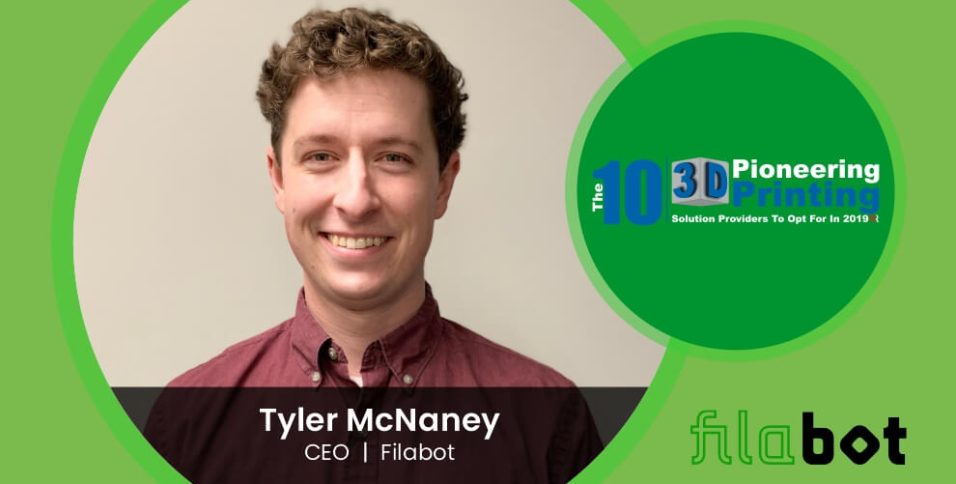The advancements in the 3D printing technology are rapidly disrupting the market scenario. It is considered as the most significant technology in additive manufacturing. It is used exceedingly in various fields such as Robotics, Construction, Architecture, Medical, and many more. Most of the research and development companies, production companies, recycling-oriented businesses, colleges & universities are highly inclined to make investments in this technology.
Importantly, 3D printing is producing a great impact on the manufacturing industry from prototyping to production. This technology is on the verge to replace the traditional and tedious manufacturing processes. Likewise, the Medical R&D sector is greatly utilizing 3D printing for new developments. Additionally, to attain top quality results in the R&D or manufacturing processes, the ink (filament) used by the 3D printer and its importance cannot be underestimated. Headquartered in Barre, Vermont—Filabot is focused on high-quality product development. The idea behind its inception lies in an environmental cause as it was conceived to develop a machine that could convert plastic input plastics could be newly produced sources or from waste plastic into 3D filament.
Developing Ecologically Responsible and Sustainable Solutions
Filabot was established in 2011 and today it is an industry-leading research and development company. The team of Filabot comprises highly qualified engineers, working for a common goal of providing top-grade 3D printing solutions. The creative team works dedicatedly to advance the science of plastic extrusion for the 3D market. The company is equipped with the best-in-class machining and laboratory equipment, necessary to prototype, test, and continuously improve the system to meet the evolving needs of the clients. With its plastic to filament approach, Filabot shows respect for the environment through every corporate as well as individual decision and encourages green-technology.
 Simple and User-friendly Products
Simple and User-friendly Products
The one thing that Filabot enthusiastically follows is the designing of new products with simplicity and makes most user-friendly products. Their machines are designed to produce 3D filament easily at an affordable price-point. Its ability to extrude plastics enables it to work with others to help them in finding if they can turn material into 3D printing filament. Further, 3D printing has become the best way to prototype and with Filabot’s closed-loop system. It is a cycle where failed prints and old prototypes get recycled back into 3D printing filament.
With its innovative eco-friendly approach, Filabot has succeeded in developing a good client base from the research and development sector, universities & colleges, and many leading companies in the 3D printing industry.
Leader Envisioned to Use Technology for a Noble Cause
What fascinates Tyler McNaney; the CEO of Filabot is the fact that the Fused Deposit Material (FDM) and Fused Filament Fabrication (FFF) 3D printing enables creating a closed-loop recycling system. This allows the user to take plastics and turn it into filament that can be converted into 3D prints again.
Tyler’s move of creating Filabot to recycle plastic waste named him as amongst the “Most Successful Entrepreneurs of the Next Ten Years” by ‘The World Future Society.’ Recently, in 2018, Forbes magazine featured Tyler in “Forbes 30 Under 30 to Watch: In Manufacturing and Industry.” Filabot has also been published in Popular Science, Fast Company, and Tech-crunch for its innovative work. Today, Tyler proudly gives credit for his success to mentors in his life for allowing him to follow his dream and discover several options. It also taught him to be a good leader and gave the motivation to strive hard to move forward and achieve the goal.
Of all the applications of 3D printing, one that has produced a strong impact on Tyler is ‘e-Nable hands.’ When asked more about it, he asserted, “e-Nable hands is a community of individuals who work together to print prosthetic limbs. These limbs are built at over 99% of the cost of conventional limbs. Outgrowing these prosthetic limbs is no longer a problem as it is simple to upgrade. This community has taken 3D printing and applied it to a real-world problem. This community is fantastic and can truly show the good we can do.”
Strategy for Staying Ahead
Presently, at the Filabot’s office, Tyler has a close group of multitalented team who are actively involved in running marketing meetings to designing the latest products using CAD software to inventing novel things and building unique projects. Likewise, the rapidly changing technologies make it challenging for Tyler to define and express his vision to the team. Tyler sets his vision according to the latest trends in the 3D printing technology, new innovations or changes made by others in the sector, and the information or feedback received on their products. Therefore, as per these transformations, Tyler makes dynamic and ever-changing future strategies for his company.
Filabot always strives to make new advancements in 3D printing technology and is continuously updating its processes to improve the existing products as well as newly planned products. It is always making moves that shift it closer to the goal of recycling the abundant quantity of plastic. The team constantly works to understand the detailed formula so that the extruding of many types of plastics is possible. Also, it actively works with other companies to provide testing services on different materials to see if they can be converted to filaments with Filabot’s system and these associations help in learning more about the product and ways to improve them.



 Simple and User-friendly Products
Simple and User-friendly Products

